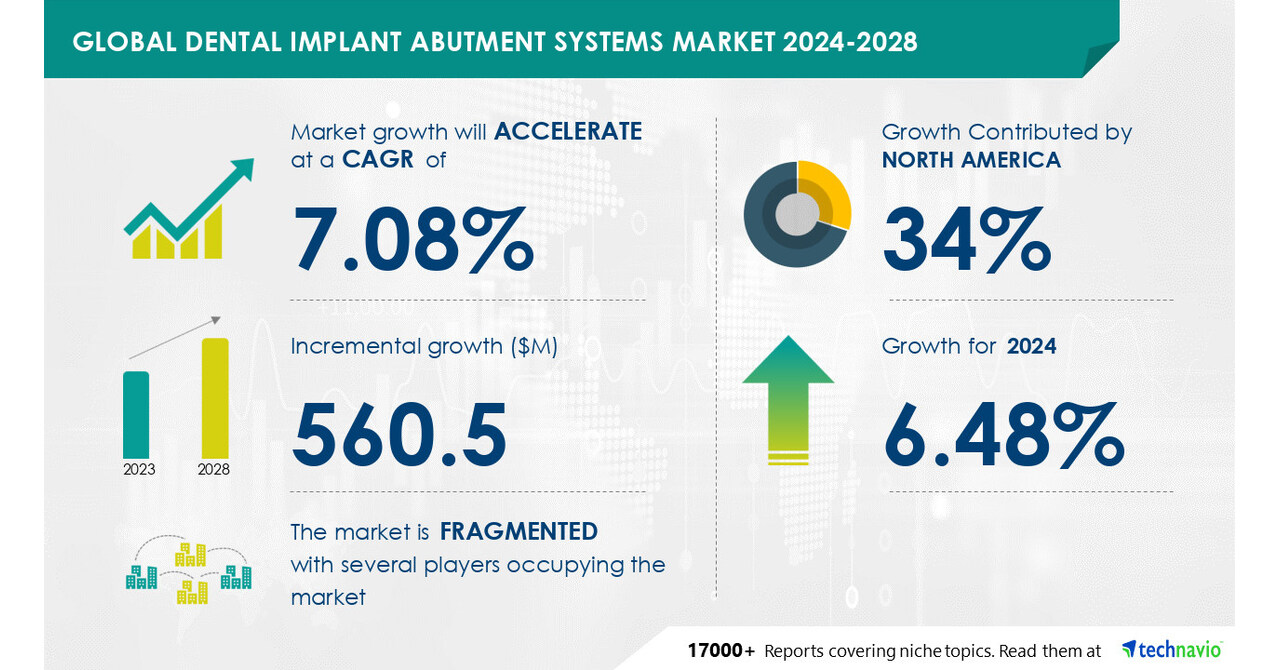The global dental implant abutment systems market is predicted to experience a significant upswing in the next few years, with Technavio estimating a growth of £450 million from 2024 to 2028. This growth is attributed to a rising prevalence of dental diseases and a shift towards innovative technologies in the field. However, the market also faces challenges due to potential limitations and complications associated with these systems.
Driving Forces Behind the Growth
The increasing demand for dental implant abutment systems can be attributed to several key factors:
Rising Prevalence of Dental Diseases: The growing occurrence of tooth decay, periodontal diseases, and tooth loss is a major driver for the market.
Technological Advancements: The development of next-generation abutment systems with enhanced surface technologies and the introduction of 3D printed abutments using scanning, CAD, and 3D plastic and metal printing have revolutionized the industry. These innovations have simplified the process for artificial tooth replacement, leading to fewer visits and less invasive procedures.
Increased Awareness of Oral Health: Growing awareness of oral health and its impact on overall well-being has led to increased investment in dental care, including implant procedures.
Challenges Facing the Market
Despite the positive growth prospects, the dental implant abutment systems market faces several challenges:
Complications and Limitations: The success of implant procedures can be affected by factors like osseointegration (integration of the implant with the bone) and periimplantitis (inflammation around the implant).
Early and Long-Term Complications: Issues such as infection, swelling, pain, instability, and nerve damage can occur after surgery, impacting the overall success of the procedure and potentially hindering market growth.
Biocompatibility and Materials: Ensuring that implants are biocompatible and allergy-free is a crucial challenge. The use of titanium, a common material for abutments, requires strict quality control.
Market Segmentation
The dental implant abutment systems market can be segmented based on various factors:
Product:
Stock/Pre-fabricated Abutment Systems: These systems offer pre-designed solutions for a wide range of applications, with leading players like Straumann, Nobel Biocare, and Dentsply Sirona leading the market.
Custom Abutment Systems: These systems offer tailored solutions for individual patients, providing a more personalised approach to dental care.
Technology: Advances in implant technology, including surface treatment, implant design, and CAD/CAM systems, are driving growth in the market.
Geography: The global market is segmented into North America, Europe, Asia, and the Rest of the World (ROW). North America currently holds the largest market share, but Asia is expected to experience significant growth in the coming years.
Key Companies Shaping the Market
Several leading companies are driving innovation and competition within the dental implant abutment systems market. Some prominent players include:
Adamas Implants Ltd.
Argen Corp.
Arum Europe GmbH
Bio3 Implants GmbH
Bioconcept Co. Ltd.
Bone System Srl
BTI Biotechnology Institute S.L.
Cendres Metaux Management SA
Cortex Dental Implants Industries Ltd.
Danaher Corp.
Dentsply Sirona Inc.
DESS Dental Smart Solutions
Ditron Dental
Dyna Dental Engineering
Dynamic Abutment Solutions
Institut Straumann AG
Nobel Biocare Services AG.
ZEST Anchors LLC
Zimmer Biomet Holdings Inc.
The Future of the Dental Implant Abutment Systems Market
The dental implant abutment systems market is expected to continue its growth trajectory in the foreseeable future, driven by increasing demand for dental solutions, technological advancements, and a rising awareness of oral health. However, the market must address challenges related to complications, biocompatibility, and materials to ensure sustainable and ethical growth.
To learn more about the dental implant abutment systems market and its potential, visit Technavio's website for their comprehensive research report.

